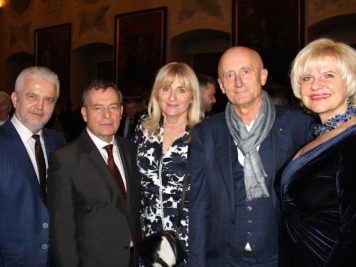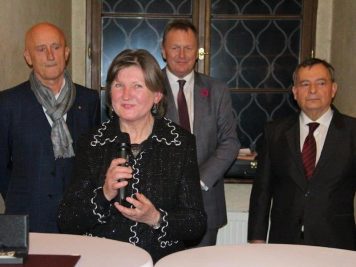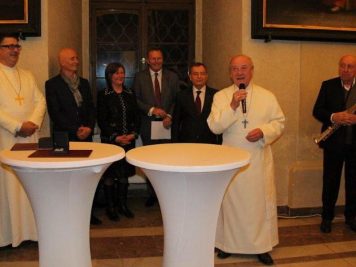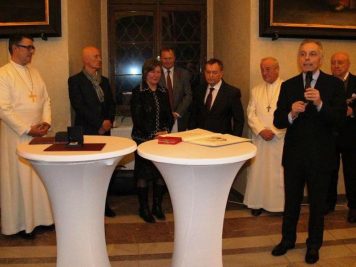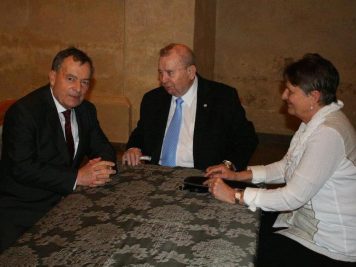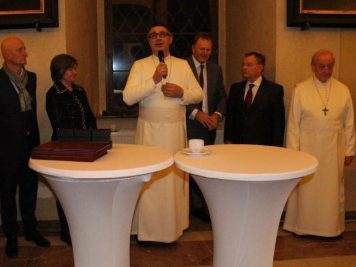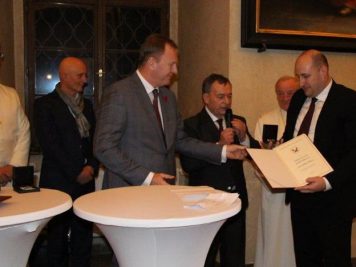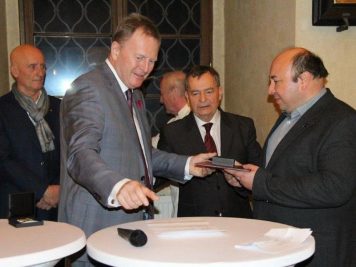The Czechoslovak Foreign Institute, established 90 years ago, celebrated its jubilee at the Strahov Monastery in Prague, with the participation of three hundred members, personalities from the social and political life and foreign diplomats. A turnout of guests represents a clear evidence of the Institute being perceived as an important and respectable institution.
The chairman of the Czechoslovak Foreign Institute Jaromír Šlápota welcomed the guests and thanked them for taking their time to celebrate the anniversary of the institution, which at the time when we hear from media more information about the split and messed up society, brings people together and unites them. The abbot Daniel Peter Janáček then appreciated the fact that over the last ninety years of its existence the Institute managed to retain its relevance and keep itself up to date. Prof. PhDr. Ivo Barteček, CSc. mentioned the three generations of personalities of the Czechoslovak Foreign Institute: the first generation of the founders, who in the years 1929–1939 sought to create the new institution to support the national economy and social order and at the same time to help the Czechs and Slovaks living and working abroad, the second generation associated with the restoration activities of the Institute after 1945 and the following four decades full of turbulence, and the third generation, which after 1990 managed to return the Institute its originally intended mission and is inherently associated with the name of the current chairman Jaromír Šlápota, who has been leading the Institute since the middle of 1992.
On the occasion of the 90th anniversary of the Czechoslovak Foreign Institute eight personalities and one institution have been honoured for contributing to the improvement of teaching Czech compatriots abroad. A thank-you certificate and commemorative Silver Lion were awarded to: JUDr. Eva Dobrohrušková, Ing. Vladimír Bezděk, M.A., Vladimír Bílek from Croatia, Ing. Karl Hanzl from Austria, JUDr. Jaroslav Hot, Michael Joseph Pojezdný, Ing. Petar Petkovov Stanchev, Evermod Gejza Šidlovský and the company MADFINGER Games, a.s. Brno. The award was accepted by co-founder of the company Tomáš Šlápota. Then, the recepients had the pleasant opportunity to enjoy the art of Felix Slováček, musician and member of the Institute.
“Is 90 years in the life of a community a lot or a little? It is enough. Since this community has been alive all the time, it means it is a good community,” Michael Joseph Pojezdný, the former long-time abbot of the Strahov Monastery and a member of the Institute, said in his speech on the address of the Institute. Vladimír Bílek, a member of the Croatian synod for the Czech and Slovak minority, greeted those present on behalf of eleven thousand compatriots in Croatia, who profess to be of the Czech nationality, and thanked to the Czechoslovak Foreign Institute for the excellent cooperation and care of the equipment of Czech schools in Croatia, which are teaching Czech to 1,500 children. “For expatriates in Austria, living there already for four generations, the Czechoslovak Foreign Institute is an important link with their old homeland. At the present time when there are no easy conditions for the maintenance of the Czech language in the world, the cooperation with the Institute is even more important for them”, Ing. Karel Hanzl, the chairman of the Komenský School association in Vienna mentioned and he handed over to the Czechoslovak Foreign Institute an honorary plaque, as an award for a long meritorious work for education of youth and for its dedicated action in favour of the development of the expatriate movement in Vienna. Then PhDr. Libuše Benešová and Senator Ivo Valenta, vice-chairmen of the Institute, thanked to all the members who had contributed to the implementation of the Czechoslovak Foreign Institute projects for compatriots.
The final word belonged once again to the chairman of the Czechoslovak Foreign Institute. He stressed the principle of tolerance, which the Institute has in its statutes, and which allows a useful collaboration of people of various political views, he remembered the names of the members, who had left their marks in the Czechoslovak Foreign Institute, and mentioned the fact that the Institute never changed the attribute Czechoslovak in its title and still remains a patriotic institution. At the conclusion, similarly as ten years ago at the St. Agnes convent, when the Czechoslovak Foreign Institute celebrated its 80th birthday, he wished participants good health so that they could get together in next ten years at the party to celebrate hundred years of the Czechoslovak Foreign Institute activity.


